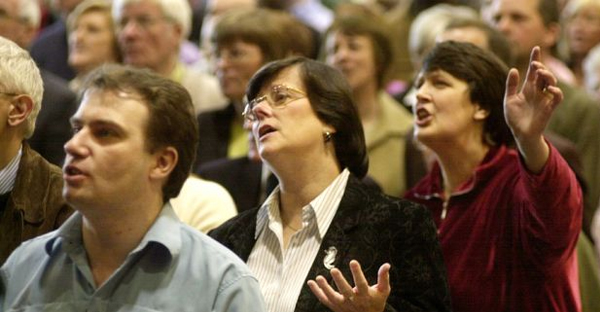[ad_1]

Christians attending an Evangelical Alliance conference. Increased diversity, and the erosion of near-monopolies of religion by institutional denominations, is good news for forms of religion that lay a large stress on personal choice and decision.
It’s 5.30pm on a Sunday in central Dublin. Just off O’Connell Street, tourists in T-shirts tramp past yet another of Dublin’s fine old churches without giving it a second glance. A typical scene that seems to embody the post-Christian secularity of our capital city.
Then you step inside that old church building, and your perceptions are transformed. Every one of the dark wooden pews is crammed to capacity. The balcony is overflowing. On one side of the ornate pulpit a 50-voice choir – images being projected onto a huge screen at the front – is singing in beautiful harmonies.
Over 700 worshippers, all of them adults, are listening in rapt attention. Downstairs over 200 children are engrossed in Sunday school classes. It’s hard to remember that, just yards away, open-top buses are rumbling past.
You have stumbled into one of the many manifestations of a religious revolution of which tourists, and most Irish people, are completely unaware even though it is taking place right under our noses.
This congregation is just one of dozens of Romanian Evangelical and Pentecostal churches that meet across Ireland. Some are small, but others are fast outgrowing any venue that they can rent. Recently another Romanian church, to the west of the city, was granted planning permission to construct a building to seat over 1,000 worshippers each week.
And it’s not just Romanians that are meeting in this way. The Redeemed Christian Church of God, a denomination founded in Nigeria, has over 100 congregations in the Irish Republic.
You can add to that the many Filipino churches, Indian churches, Brazilian churches, Russian-speaking churches, Korean churches, Chinese churches and hundreds of other congregations that cater predominantly to the “new Irish”.
Click here to read more.
SOURCE: The Irish Times
Nick Park is executive director of Evangelical Alliance Ireland. He is also pastor of the Solid Rock Church in Drogheda, Co Louth, a congregation comprising worshippers of over 40 nationalities.
Related
[ad_2]
Source link
